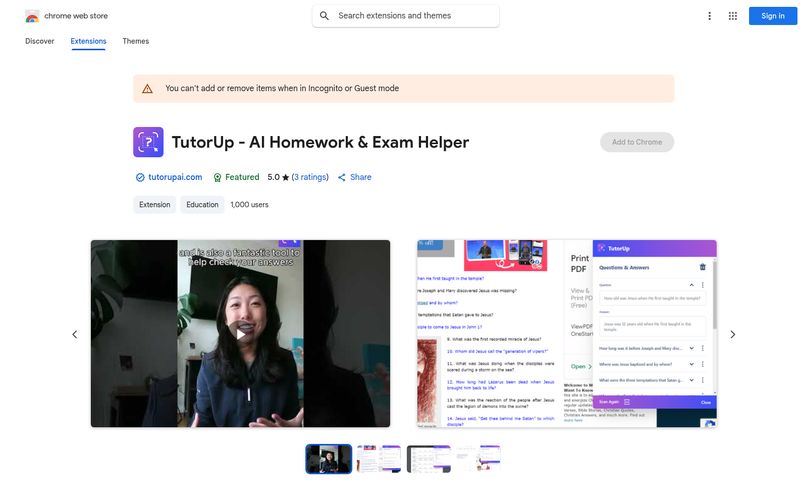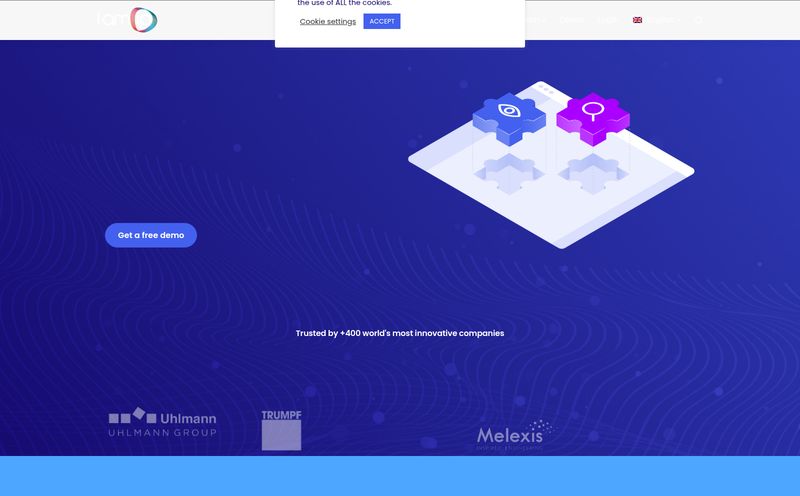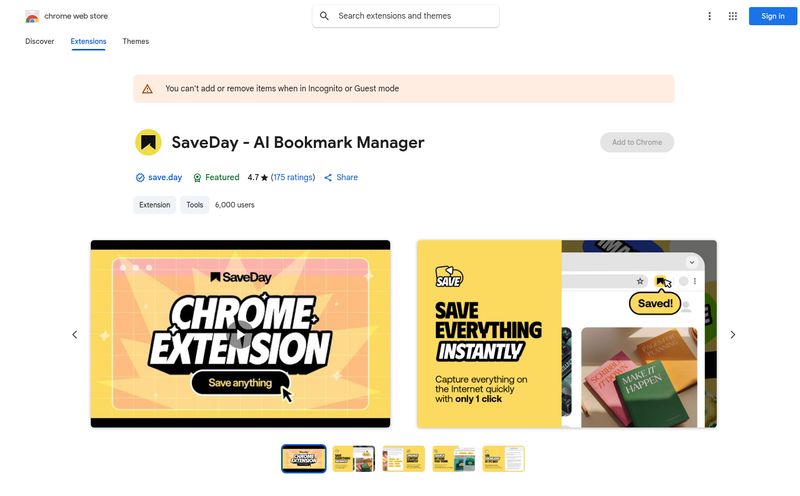We've all been there. You have a simple question, you type it into Google, and you're met with a wall. A wall of ads, followed by a bunch of SEO-optimized listicles that take 800 words to answer a 'yes' or 'no' question. The modern internet search is... well, it's a bit of a slog, isn't it? As an SEO professional, I'm part of the system, I get it. But as a user, I’m just as tired as you are.
For years, we've heard whispers of a 'Google killer'. Most have come and gone without making a dent. But the recent explosion in AI has changed the game. So when I stumbled upon 秘塔AI搜索 (Mita AI Search), my curiosity was definitely piqued. It claims to be an AI-powered search engine with no ads and direct answers. Sounds too good to be true, right? I thought so too. So I rolled up my sleeves and spent some quality time with it. Here's what I found.
So, What is Mita AI Search, Anyway?
First off, Mita AI Search isn't just another search engine that repackages Google's results with a different logo. It's fundamentally different. Think of it less like a massive, dusty library card catalog that points you to the right aisle (that's Google), and more like having a direct conversation with a super-smart librarian who just gives you the answer. It reads all the books for you and then summarizes the important bits. No ads. I have to say that again because it’s such a breath of fresh air. It feels like how the internet was supposed to feel.
The entire platform is built around the idea of being an answer engine. You don't just get a list of ten blue links and a prayer. You get a synthesized, structured response generated by AI, complete with sources. It's designed to cut through the noise and deliver information, not just links.
The Features That Actually Matter
A tool can have a million features, but only a few really change your workflow. Mita has a few of those.
Direct Answers, Not Just Blue Links
This is the main event. You ask a question like, "What are the pros and cons of intermittent fasting for athletes?" and instead of getting a page of competing articles, Mita gives you a structured breakdown. It pulls information from various sources and presents it as a coherent summary, almost like a mini-report. It's incredible for getting a quick, high-level overview of a topic without having to click through five different tabs and get bombarded by cookie pop-ups and newsletter sign-ups. A real time-saver.

Visit 秘塔AI搜索
A Researcher's New Best Friend
Okay, this part really got my attention. Mita allows you to customize your search scope. You can tell it to search the whole web, or you can narrow its focus to just academic literature. For students, academics, or even content writers like me who need to back up claims with real studies, this is a massive deal. It gives you access to literature databases and helps you build a research workflow right inside the tool. I’ve spent countless hours sifting through Google Scholar, and while powerful, it's not always the most intuitive. Mita's approach feels more guided, more like a research assistant.
Choose Your Own Adventure... I Mean, Learning Style
Another neat trick up its sleeve is the ability to adapt to different research styles. This is a bit more abstract, but from my playing around with it, it seems you can coax it into giving you information in different formats. Sometimes you want the 'executive summary', other times you want a deep, point-by-point analysis. While not a perfectly defined feature, the flexibility is there if you craft your prompts correctly. It's a subtle but powerful touch that acknowledges that not everyone absorbs information in the same way.
The Good, The Bad, and The AI
No tool is perfect, especially not in the fast-moving world of AI. My experience with Mita was overwhelmingly positive, but it's important to go in with your eyes open. Here's my honest breakdown.
What I Absolutely Loved
The ad-free experience is, without a doubt, the number one reason to try Mita. It changes the entire psychology of searching; it feels less transactional and more purely informational. The concise, summarized results are a close second. For 80% of my daily queries, I don't need a 3,000-word dissertation, I just need the facts, and Mita delivers them beautifully. It's what I always hoped Google's featured snippets would be, but without the baggage. The AI-powered summarization is genuinely a game-changer for initial topic research.
Where It Stumbles a Bit
Now for the reality check. The biggest drawback is that the AI's knowledge base, while impressive, isn't as comprehensive as Google's colossal index. Google has been crawling the web for decades; Mita hasn't. For very niche or extremely recent topics, you might find the results a bit thin. Its smart, but it hasn't read everything yet. Also, the quality of the summaries can vary. Sometimes they are pure genius, other times they feel a little... off, or they miss a critical point. You still need to use your critical thinking skills and check the sources. And, like any AI, it's susceptible to the biases present in its training data. It's something to be mindful of. The information it presents feels authoritative, so you have to remind yourself to question it.
Who Is Mita AI Search Actually For?
So, should you ditch Google and switch to Mita for everything? Maybe not just yet. But for certain people, this tool could be a revelation.
- Students and Academics: Honestly, this is a no-brainer. The academic search scope, the summarization features, the ad-free environment... it's practically built for you. It can dramatically speed up the literature review process.
- Content Creators and SEOs: For us, Mita is an exceptional starting point for research. It helps you get the lay of the land on any topic, identify key subtopics, and find credible sources without getting lost in the SERP jungle. I wouldn't use it for keyword research, but for topic research? Absolutely.
- The Everyday Curious User: If you're someone who is simply fed up with Google's ads and just wants straight answers to your questions, give Mita a shot. It's a calmer, more focused way to find information online.
The All-Important Question: The Price
So, what's the damage to the old wallet for this futuristic search experience? This is the best part. As far as I can tell, Mita AI Search is currently free to use. I couldn't find a pricing page or any mention of a paid tier. Now, I've been in this industry long enough to know that things can change. I wouldn't be surprised to see a 'Pro' plan in the future with more advanced features, higher usage limits, or API access for businesses. But for now, you can get all this value for the grand price of nothing. It's a pretty compelling offer.
Final Thoughts: Is This the Future of Search?
Mita AI Search isn't going to kill Google overnight. Let's get that out of the way. Google is a behemoth, deeply integrated into our digital lives. But Mita, and tools like it, represent a fundamental shift. They are changing the paradigm from searching to knowing. They aim to provide understanding, not just options.
It has its limitations, for sure. But the experience is so refreshingly different, so focused, and so respectful of my time that it's earned a permanent spot in my browser's bookmarks. It won't replace Google for me entirely, but for focused research and quick answers, it's my new go-to. It feels like a glimpse into the future of how we interact with information. And I have to say, the future looks pretty good. And best of all, it's ad-free.
Frequently Asked Questions
- What exactly is Mita AI Search?
- Mita AI Search (秘塔AI搜索) is an AI-first search engine that provides direct, summarized answers to your questions instead of just a list of links. It's designed to be ad-free and is particularly strong for research tasks.
- Is Mita AI Search better than Google?
- It's different. For quick, summarized answers and academic research in an ad-free environment, many people might find it better. For comprehensive searches on very niche or breaking news topics, Google's massive index still has an edge.
- Is Mita AI Search free to use?
- Yes, as of this writing, Mita AI Search is completely free to use. There is no pricing information available, though that could change in the future.
- What are the main drawbacks of using Mita AI Search?
- The main drawbacks are a potentially more limited knowledge base compared to Google, variable quality in the AI-generated summaries, and the possibility of inherent AI bias in the results. You still need to verify the information.
- Can I really use it for academic research?
- Absolutely. One of its standout features is the ability to limit the search scope to academic literature, making it a powerful tool for students and researchers to find and summarize scholarly articles.
Reference and Sources
Throughout this review, my analysis was based on hands-on use of the tool and the general understanding of the AI search space. For further reading, here are some resources:
- The official Mita AI Search website: metaso.cn
- An interesting take on the evolution of search by WIRED: The Generative AI Race to Replace the Search Bar
- For more on the challenges of AI, this article from the Brookings Institution offers good perspective: Algorithmic bias, what it is and how to address it



